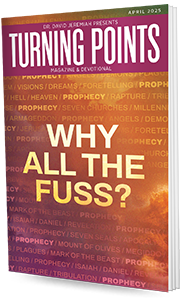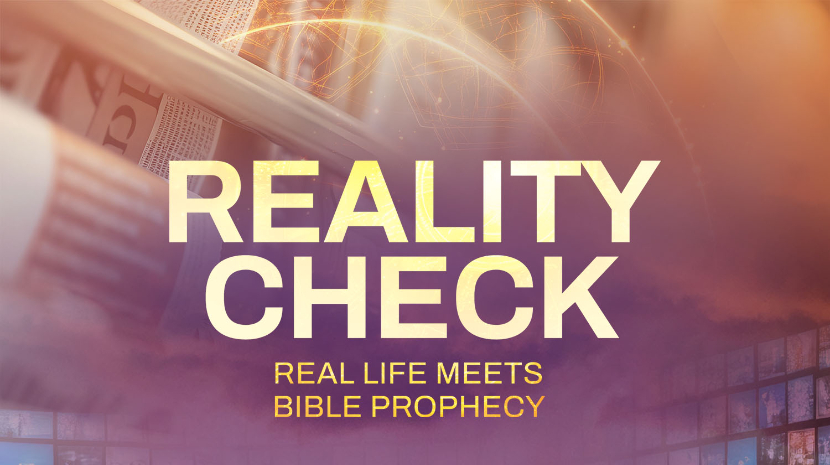From the December 2021 Issue

Keep Christ in Christmas... Focus on the Nativity, Not Society!
I’m not a big fan of clichés; I don’t use them often in writing or speaking. Mainly because, as the dictionaries tell us, clichés betray a lack of original thought stemming from overuse. You know what I mean: “Actions speak louder than words”; “The grass is always greener on the other side of the fence”; “You can’t judge a book by its cover”—and on and on. Clichés roll off the tongue so fast that we don’t have, or take, the time to think creatively and put a different spin on the subject.
But wait—not so fast. The reason some sayings get frequently used is because there is an element of truth in them. Look at the three clichés I just cited, and you’ll see what I mean. There is a kernel of truth in most time-tested clichés.
Christmas has become one of the most complicated seasons of the year.
You probably have guessed the cliché I’m talking about: Jesus is the reason for the season. I can’t think of a better way to summarize what is most important about the season we are entering. It’s short, it’s memorable, and it’s true—just what we need to stay focused.
Christmas has become one of the most complicated seasons of the year. It plays a huge part in the economic success of many businesses. Indeed, the entire economy anticipates the jolt and boost provided by Christmas shopping and other seasonal activity. So much so that Jesus has, in large part, been removed from much of the season. In our post-Christian culture overall, Jesus is no longer the reason for Christmas. Instead, the reasons have become family, food, fun, and festivity. There’s nothing wrong with those, of course. But those aren’t the reasons for the season.
There is only one primary reason for the season. As Christians, we have to fight against the temptation to lose sight of Christ during Christmas. We have to make sure, at least in our personal and family life, that He remains the reason for the season.
Listing the Reasons
Let’s briefly break down this cliché to see why it remains valid in 2021:
- Jesus. Simply put, without the birth of Jesus there would be no Christmas celebration. Granted, no one knows the exact date of Jesus’ birth, but December 25 was settled on as the celebration day in the Roman church by the fourth century A.D. (Some Eastern and Armenian churches settled on January 6 or 7 based on their calendar system.) The ambiguity of the date raises an important point: Christmas Day is not the reason for the season. Jesus is the reason for the season. Christmas is not about celebrating a particular day on the calendar; it is about celebrating the Incarnation—the fact that “the Word became flesh and dwelt among us” (John 1:14). For three years in the first century, people in Israel “beheld His glory, the glory as of the only begotten of the Father, full of grace and truth” (John 1:14). We cannot behold His glory in person today, but we can celebrate His glory at Christmas when we celebrate His birth. Remove Jesus Christ from Christmas and you have nothing but a secular celebration.
- The reason. I don’t know who wrote the Wikipedia article on “Christmas,” but he or she captured the reason for the season pretty accurately: “For Christians, believing that God came into the world in the form of man to atone for the sins of humanity, rather than knowing Jesus’ exact birth date, is considered to be the primary purpose [reason] in celebrating Christmas.”1 That reason for Christmas has been lost at various times in Church history. In seventeenth-century Puritan England, Christmas was basically banned for nearly twenty years because it became an excuse for drunkenness and rowdy behavior. That’s not the reason for celebrating Christmas! When we think of Christmas, our reasons are Jesus’ incarnation, Jesus’ death for our sins, Jesus’ resurrection, Jesus reconciling us to the Father, and Jesus’ promise of eternal life—not to mention His coming again!
- The season. A season is a time characterized by certain traits or conditions—think winter, spring, summer, or fall. So what is the Christmas season? Let’s arbitrarily call it December plus the first half of January: pre-celebration, celebration, and post-celebration. Too often we focus on schedules, breaks from work or school, social engagements, and gift giving. Again, there is nothing wrong with those. But that’s not what should characterize the Christmas season. More than any other time of the year, the Christmas season is a time for renewal, reminders, and reflections on what Jesus did—leaving the glories of heaven, being born in a stable, and living a perfect life on our behalf. It is a time for rejoicing in the Church, for acts of generosity and service, and for sharing with others the true reason for Christmas.
Living the Reasons
Remove Jesus Christ from Christmas and you have nothing but a secular celebration.
First, share the Savior. When you share gifts with non-Christian neighbors, relatives, or coworkers, include a note with a verse of Scripture pointing to Jesus. If you have unchurched friends, invite them to attend your church’s Christmas Eve or Christmas Day service. If there are singles or shut-ins who don’t have family to join for Christmas, invite them into your home. These are all things Jesus did for us, and things we can do for others in His Name.
Second, share the hope. Christmas can be a hopeless time for many, especially depending on what is happening in the world. As you keep your own heart and mind focused on the “sure and steadfast” hope that is “an anchor of the soul” (Hebrews 6:19), you can be a source of hope for others. Hopeless folks are desperate for reasons to have hope in this world—and Christmas is the most hopeful time of the year for those who know Jesus.
Christmas is the most hopeful time of the year for those who know Jesus.
Fourth, share the joy. Anyone who has Jesus, hope, and peace in Him, will surely have joy! Does any Christmas hymn say it better than “Joy to the World”? Right in the first line of the hymn we find the reason for having joy at Christmas: “The Lord is come”! And then comes the admonition, “Let ev’ry heart prepare Him room”—which makes us ask, Have I prepared room in my heart this Christmas for Jesus? Let Jesus give you His joy so you can share that joy with others.
This entire issue of Turning Points will challenge you to keep Christ in Christmas this year—to remember that Jesus is the reason for this most blessed season. You’ll find three additional articles full of biblical insights and practical ways to do just that: “Give Him Room…Make a Place,” “Worship the Baby…Tell Everyone You See,” and “Follow the Star…Live in the Light.”
Let’s not be frustrated or cynical about how the world views Christmas. Instead, let’s be the Christmas we would want the world to share! When our Christmas season is filled with celebrations of His birth and life, others will take note and see something different. If they see in our life the Jesus whose birth we celebrate, this Christmas may be a new beginning for them.
Sources:
1"Christmas," Wikipedia.com, https://en.wikipedia.org/wiki/Christmas.
2Jill Jackson, “Let There Be Peace on Earth,” 1955.
More Articles
This Month's Magazine Resource

Escape the Coming Night
Studying biblical prophecy might seem overwhelming, especially diving into the book of Revelation. But as Dr. David Jeremiah walks you step by step through Revelation, you will uncover the meaning of terms and events and gain a deeper knowledge of Bible prophecy.
Subscribe Now
Each month, read articles and devotionals from Dr. David Jeremiah that will encourage, challenge, and strengthen your walk with the Lord.



















